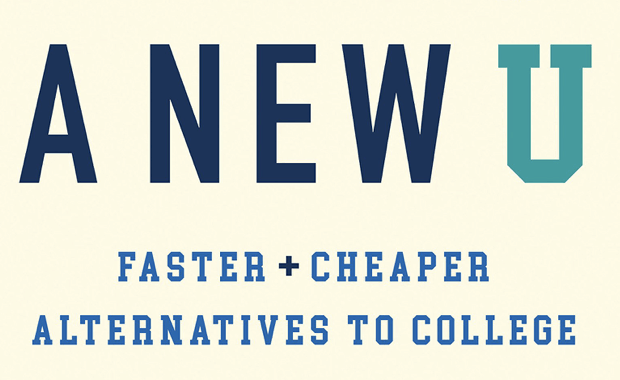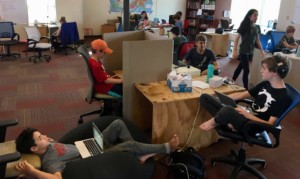How Faster + Cheaper Alternatives Will Replace Most of HigherEd

Unresponsive, incoherent and expensive. That’s how Ryan Craig sees higher education. He’s a leading critic of the status quo and advocate for and investor in postsecondary innovation.
The first third of Craig’s soon to be released book, A New U, convincingly outlines the problem starting with, “too much of a good thing.” He’s referring to fancy campuses, expensive amenities, big course catalogs, and not much focus. He notes worst case scenario–half of the young people that start college don’t earn a degree but leave with piles of debt.
As an alternative, Craig’s introduction highlights three examples of nontraditional (i.e., not including college) postsecondary training that serve as viable pathways to high wage employment.
Craig makes the point that everything is getting faster and cheaper. “For Millennials and Gen Z, convenience, speed and value are fundamental to American life.” His central point is that the same should be true for higher ed.
He documents “the early days of the faster + cheaper revolution that will upend the traditional college route as America falls out of love with the bachelor’s degrees, particularly from non-selective colleges.”
Craig acknowledges the benefits of selective universities especially if they come with generous aid. But he puts up big flashing red light for unaffordable non-selective schools. He posts a warning yellow light for other schools and encourages investigation of alternatives.
Outlining the growth of technical fields, Craig notes that “colleges haven’t been good at adapting to these changes in the job market.” And, “Even for programs that appear highly relevant—BSc in computer science, for example—the curriculum is much less applied than employers want.”
Craig closes his case for change with the lack of work experience and work skills that most college graduates leave school, a timely and important concern that continues to gain recognition—organizations like JFF (Jobs for the Future) are developing ambitious initiatives to bridge gaps between educators, policymakers, and the private sector.
The Faster + Cheaper Revolution
College has always been a “you pays your money and you takes your chance” proposition. Craig sees a very different future, one where most postsecondary training aims at a guaranteed outcome and is free or at least debt-free.
This new job-focused training, what Craig calls “last mile programs” share six characteristics: a focus on technical skills as well as job skills; intensity of applied effort in a “bootcamp” setting; demonstrated competencies rather than grades and credits; strong connections to employers; clear pathways to high demand, high wage jobs; and jobs rather than credentials as the real finish line.
Coding bootcamps were the first last mile programs. Most current programs top-up college graduates that need employment skills. Financing is increasingly available based on future incomes.
Borrowing from lean startup methodology, Craig suggests that innovation in higher education could begin with the development of a minimum viable product (MVP)—programs focused on employment skills financed by income share agreements. Many of these MVPs will include guaranteed employment, apprenticeships (physical and digital) and placement programs.
Intensity and relevance is key to successful last mile programs. Fully online programs struggle to deliver that intensity. Instead, technology will transform education through competency marketplaces and competency-based hiring.
Craig points to the growing international backlash against expensive higher ed in the UK, Singapore, and even education-obsessed South Korea.
He predicts big dislocation and acknowledges a lot of rural and suburban communities will be hurt by closing colleges. And, because most faster + cheaper alternatives will grow in urban areas, it will exacerbate the urban-rural divide in America predicts Craig.
He acknowledges the potential loss of discovery, serendipity, and wonder experienced while wandering aimlessly through the first few years of an expensive college experience but says because “the patient is bleeding out on the table” it’s time for dramatic change.
Craig finds promising the rise of affordable options like Paul Quinn College that combine academic focus, financial aid, and work to keep cost and debt to a minimum.
Community colleges still focus on associate’s degrees and promise a pathway to a bachelor’s degrees but that rarely happens, argues Craig. Instead, he says, community college should reinvent themselves as a placement service and work with employers to build training based on real jobs.
“Pathways to good first jobs in growing sectors of the economy don’t need to be shoehorned into credentials,” said Craig. The key isn’t the degree, it’s preparation for a good first job.
“Millions of students will opt for a faster + cheaper alternative…and perhaps sooner than anyone thinks,” concludes Craig.
For more, see:
- Imagining a Blockchain University
- 10 Corporate and Higher Education Examples of Competency-Based Programs
- How Cities are Getting Smart Using Artificial Intelligence
This post was originally published on Forbes.
Stay in-the-know with all things edtech and innovations in learning by signing up to receive the weekly Smart Update.






Dr. Rebecca Meeder
Great article! If colleges start to move in this direction, I wonder how online courses will be impacted.